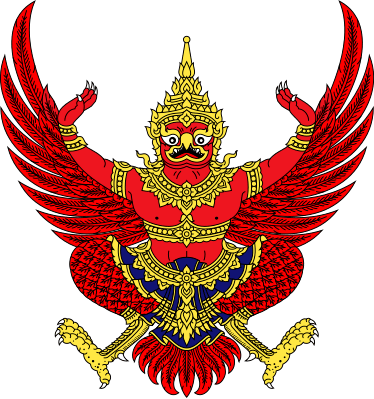- Information
- iGambling
- Blask
- prev
- next
Gambling regulation
-
Online casino:Illegal
-
Online sports betting:Illegal
-
Gambling in detail:
Population
- Population: 68147000 people.
- Official Language: Thai
- HDI: 0,803
- Salary: $542
- Poverty rate: 12.2%
- Gini: 35.9%
- Main religion: Buddhism (93.2%)
- Second religion: Islam (5.5%)
Harmful habits
- Alcohol: 6.9 litres/year
- Smoking: 22.1%
Internet
- Internet users: 75.5%
- Mobile Internet: 70.3%
- Landline Internet: 27.3%
- Internet speed: 33.5 Mbps
- Country Top Level Domain: .TH
General information about the country
-
Country name:Thailand
-
Code (2-digit):TH
-
Continent:Asia
-
Country level:Tier 2
-
Capital:Bangkok
-
Country area:514000 sq km.
-
Telephone code:66
-
Currency (code):Baht (THB)
Geographical features of the country
Administrative division into regions
Province (22): Ayutthaya, Khon Kaen, Lampang, Nakhonpatkhom, Nakhonratchasima, Nakhonsawan, Nakhonsitthammarat, Nonthaburi, Phitsanulok, Phuket, Rayong, Samutprakan, Samutsakhon, Songkhla, Surat Thani, Trang, Ubonratchathani, Udon Thani, Chiang Mai, Chiang Rai, Chonburi, Yala.
Special administrative region: Bangkok.
Features of the country
The modern territory of the country was partially or fully occupied by the states of: Baphnom, Dwarawati, Nanchao, Kambujadesha (Khmer Empire), Siam, Sukhothai, Ayutthaya, Lansang.
Thailand is washed by seas: South China Sea, Andaman Sea.
Thailand has access to the following lakes: Thaleluang, Thalesap.
The following rivers flow through the territory: Mekong, Salween, Mun, Yom, Ping, Pasak, Nan, Khweiay, Chao Phraya, Wang, Thachin, Khuenoi, Makhlong, Nakhonnaiok, Bangpakong, Raka, Prachinburi.
Thailand owns the islands of Phuket, Samui, Chang, Kut, Phangan, Tarutao, Lanta Yai, Similan, Phiphi Don, Tau.
Famous caves in the territory of the country: Tam Pra Uak Daeng.
Gambling regulation
-
Online casinos:Illegal
-
Online sports betting:Illegal
Read more about regulation
Thailand has a strict policy on gambling. Only the state lottery and betting on horse races are allowed in the country. Due to the limited gambling industry, Thais use illegal platforms, which contributes to the growth of crime in the state.
The sector is administered by the Gambling Control Division of Thailand. For organising an illegal gambling business in the country, offenders face a fine of $546,000 to $5,000 and/or imprisonment from 1 to 10 years.
Top brands in the country
Top 20 iGaming brands (December 2024)
- Ufabet (1,050,000)
- Fun88 (195,000)
- Bet365 (159,000)
- BK8 (149,000)
- SBOBET (99,000)
- Dafabet (96,000)
- W88 (90 000)
- GClub (65,000)
- WE88 (31,000)
- 1xBet (31,000)
- AW8 (20,000)
- EU9 (11,000)
- God55 (5,000)
- UFA88 (5,000)
- Stake (4,600)
- BC Game (4,000)
- Me88 (2,600)
- EuroMillions (1,900)
- BetVisa (1,800)
- 22Bet (1,500)
(search volume in brackets)
Top payment systems
- PayPal
- UnionPay
- PromptPay
- TrueMoney
- Tether
- Rabbit LINE Pay
- ShopeePay
- Krungsri
Online Gambling in the country
Despite the complete ban on iGaming and cultural barriers in the country's gambling sector, online gambling has become the main entertainment for many Thais.
Therefore, underground gambling establishments, which have been operating in the state for a long time (police have repeatedly uncovered such organisations in the most unusual places, including zoos and football stadiums), have become even more prevalent amid an increase in criminal online gambling schemes and the growth of illegal gambling platforms.
It is known that between 1 October 2023 and 5 March this year, the government blocked over 25,000 gambling sites. In addition, it was revealed that well-known influencers are actively involved in the illegal industry, such as Thai boxer Sutthiwat, who advertised illegal gambling sites on Facebook, Thai beauty queen from Ratchaburi province, also involved in advertising illegal gambling, and blogger Chutimu, known as Soda, who ran illegal gambling site Zigma911 with a turnover of more than $112.8 million.
Undoubtedly, authorities are cracking down on illegal operators and gambling-related crime. However, strict laws in the gambling sector contribute to the fact that many Thais are actively involved in illegal iGaming.
However, the Thai government has recently announced the legalisation of land-based casinos, scheduled to launch in 2025. The initiative to improve tourism infrastructure is expected to boost the state's appeal in China and India, which together accounted for 33 per cent of visitors to Thailand in 2019.
The future of the country's gambling laws remains an intriguing prospect. While the current stance is conservative, the economic potential carried by the iGaming sector could influence upcoming legislative reforms. However, the legalisation of online casinos in the country is not currently under consideration.
Nevertheless, any potential changes are likely to be carefully analysed for a long time, as the legalisation of land-based gambling establishments has been discussed by the authorities for more than 10 years.
Population
The country's population is around 72 million. Currently, 52.8 per cent of Thailand's residents live in urban areas, with over 10 million citizens living in the capital, Bangkok.
The nation has experienced a slowdown in population growth in recent decades. The reasons for this are improved access to education and increased quality of life. As a result, the average age of the population is increasing, indicating an aging nation.
The median age is 37 years.
The average life expectancy is 76 years.
By age groups, the population of Thailand is divided as follows:
- people over 65 years of age - 9.2 per cent
- People 14 to 65 years old - 70.9 per cent
- People from 0 to 14 years of age - 19.9 per cent.
The literacy rate (citizens can read and write) among adults (over 15 years of age) is 96 per cent and among youth (15 to 24 years of age) 98 per cent.
The main ethnic nation of the state are Thais, who form about 80 per cent of the total population. The second place is occupied by the Chinese, the main mass of which is concentrated in big cities.
Language: the official state language is Thai, a mixture of Sanskrit (an ancient language of India) and Chinese.
English proficiency in Thailand is less than 27 per cent of the population. English is mostly spoken in the major cities (Bangkok, Nonthaburi, Pattaya and others).
Religion: 93% of inhabitants profess Buddhism, about 5% - Islam (mainly in the southern regions of the country), brought by Arab merchants and Malay migrants, 2% - atheists, Christians and Hindus.
Major cities: Bangkok (capital), Nonthaburi, Pattaya, Surat Thani, Lampang.
Currency: Thai baht (THB). 100 THB = $2.88.
Financial opportunities
The level of economic inequality in Thailand is not egregious, it is even lower than the world average. However, about 6% of the population is below the poverty line, which in the case of Thailand means an income of less than $82 per person per month. In agriculture, this includes one in ten.
Thailand's multidimensional poverty rate is 0.5 per cent higher than the monetary poverty rate: people in this category lack basic needs such as water, electricity, education and health care.
The unemployment rate in the country is 1.02 per cent.
The minimum wage is $319 and the average wage is $470 (in Bangkok, people earn an average of $615).
Mentality
Thailand is the only Southeast Asian nation that has never been a colony. For Thais, this is a source of special pride.
The country values calmness and equanimity. Direct feelings cannot be expressed here, anger is condemned.
The inhabitants of Thailand, whose culture and customs were also formed under the influence of various beliefs, argue that the spirit of man, which protects him, is in the head. Therefore, it is disrespectful to ruffle the hair or touch the head.
Thais are big hunters of entertainment, fun and joy. That is why locals have grown fond of gambling, despite its complete prohibition in the country. There are gambling establishments even in every village of the state, where Thais easily spend their hard earned money, philosophising about the very concept of monetary units.
Residents believe that numbers can bring good luck or bad luck. The luckiest number is nine. Banknotes that end in nine are considered talismans.
In addition to nine, eight and three are considered lucky numbers. Thais are willing to pay a lot of money for numbers that are supposed to bring good luck (for example, to buy certain car numbers or mobile phone numbers).
The numbers four, thirteen and two are associated with death. For example, a Thai may skip the 44th year of his life: instead, he will have two 43rd birthdays or an immediate 45th birthday.
In Thailand there is an unspoken rule of ‘you can't, but if you really want to, you can or there are options’. Therefore, there is an atmosphere of permissiveness and freedom, although there are quite strict laws.
Gambling status
In Thailand, almost all types of gambling are prohibited, including online casinos and online sports betting. Only the State Lottery and betting on horse racing at the Royal Bangkok Sports Club are legalised in the country.
In general, the government's policy is based on anti-gambling principles.
The sector is administered by the Gambling Control Division of Thailand. For the organisation of illegal gambling business in the country, criminals face a fine of $546 - $5 thousand and/or imprisonment from 1 to 10 years.
It is known that Thailand is preparing a bill to legalise land-based casinos by May 2025. The purpose of the reform is to increase the number of tourists and attract foreign investment.
It is expected that the document should be approved by the Cabinet of Ministers at the end of this year, and then it will be approved by the House of Representatives and the Senate in early 2025.
At the moment it is known that the licence will be issued for 30 years with the possibility of renewal for up to 10 years, the tax rate on gambling is proposed at 17%. In addition, the company must have an initial capital of at least $286.9 million.
Las Vegas Sands, MGM Resorts and Wynn Resorts are all US companies operating in Macau that have shown interest in Thailand's gambling sector. Other companies considering this market include Macau-based Galaxy Entertainment Group and Malaysia's Genting Berhad.
The size of the iGaming market
A study conducted by the Gambling Problems Research Centre (GPEC) found that 59.6% of Thais aged 15 and above surveyed had participated in iGaming in 2021, an increase of 6.3% from 2019.
Currently, around 70% of the Thai population is actively participating in iGaming, which in turn leads to a black market valuation of $12bn.
Internet Availability
The internet penetration rate at the beginning of 2024 was 85% among the urban population and 76% among the rural population.
The number of internet users in Thailand increased by 0.1% between January 2023 and January 2024. The proportion of Thailand's population with access to Wi-Fi connectivity is projected to remain at the same level in 2029.
However, the proportion of the country's population with access to mobile internet will grow steadily between 2024 and 2029 by a total of 1.6 per cent.
The average resident spends 6-7 hours a day on the internet.
The average speed of a wireless connection via Wi-Fi is 33.5 Mbps.
The average speed of a mobile internet connection is 48.76 Mbps.
The volume of device usage:
- mobile - 87%
- desktop - 8%
- tablet - 5%
Popular web applications: Facebook, LINE (WhatsApp analogue), TikTok, Instagram, Twitter.
At the beginning of 2024, Facebook was used by 91.5% of the country's residents, LINE - 90.5%, TikTok - 83%, Instagram - 64%, Twitter - 49.6%.
Player preferences
Online slots have become the most popular form of gambling over the past year, with around 44% of Thai players participating. Next are online betting on football and horse racing (40%), lotteries (33%) and online card games (33%).
Meanwhile, younger players are increasingly interested in betting on cyber sports.
The key CA of online gambling in the country is young people (18 to 24 years old). The rest of the population prefers more traditional forms of gambling.
Gambling affiliate programmes that accept traffic from this country
- Blask data from: 06/03/2025
- The data for this section was provided by the analytical service Blask.com. Currently, the service's database contains information on 62 countries and more than 2,500 brands. You can view all available countries with Blask statistics at this link.
- Share
- prev
- next











